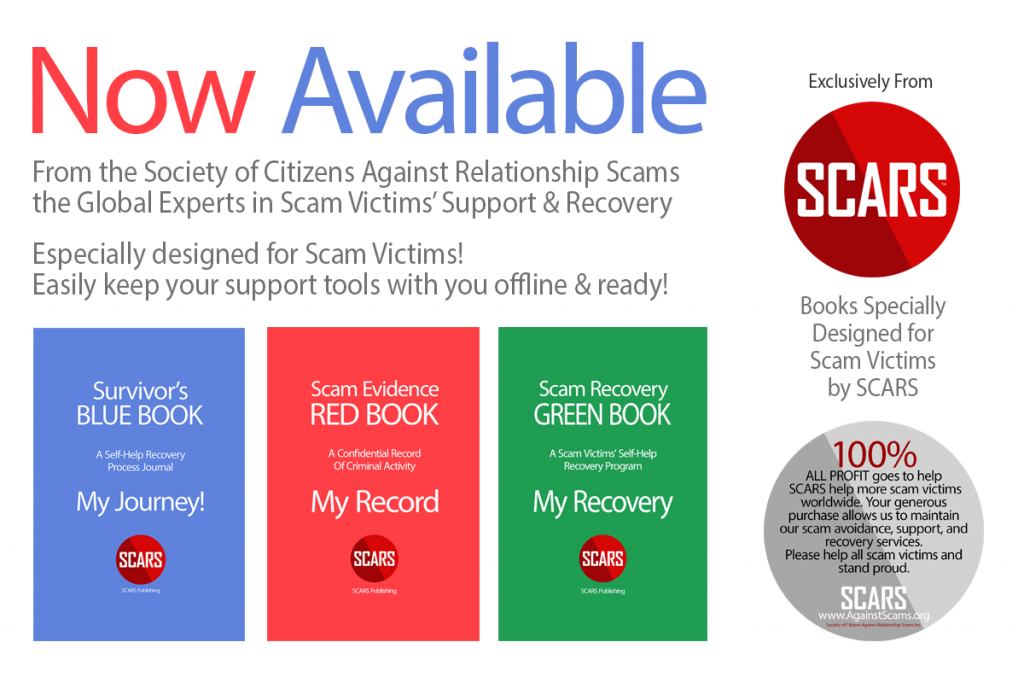SCARS Ethics, Best Practices, & Standards
At our core, the Society of Citizens Against Relationship Scams Inc. is dedicated to the professionalization and establishment of ethical standards for advocating and assisting the victims of cybercrime, scams, and financial fraud.
The Professional Advocate’s Creed!
Victim Advocacy professionals empower survivors of crime through ethical practice and the promotion of safety, healing, justice, and victims’ rights.
Like all professions rooted in service and community, there are core values that guide and unite the practicing professionals drawn to this work.
Why do Ethical Standards matter in the Profession of Crime Victims’ Assistance and Advocacy?
Ethical standards are crucial in the profession of crime victims’ assistance and advocacy for several compelling reasons:
- Protecting the Rights and Dignity of Victims: Crime victims are often in a vulnerable and emotionally distressed state, making them susceptible to exploitation and further harm. Ethical standards ensure that victims’ rights are respected, their dignity is preserved, and their experiences are handled with sensitivity and compassion.
- Maintaining Trust and Confidentiality: Crime victims entrust advocates with their personal information, including sensitive details about their experiences and the impact of the crime. Upholding ethical standards ensures that this information is treated with the utmost confidentiality and used solely for the purpose of providing assistance and advocacy.
- Promoting Effective Advocacy and Support: Ethical standards guide advocates to provide competent, informed, and unbiased assistance to victims. This includes ensuring that advocates have the necessary knowledge and skills, that they remain objective in their assessments, and that they provide victims with accurate and up-to-date information.
- Promoting Objective Victim Referrals: Not every victim can be cared for, supported, or assisted by any organization, and recognizing the limits of professional capability and boundaries of care is just as important as competent delivery of services. When crime victims cannot be assisted, it is important to refer victims to other providers or choices so that they can find the aid they need.
- Preventing Conflicts of Interest and Misconduct: Ethical standards establish clear boundaries and guidelines to prevent advocates from engaging in conflicts of interest or misconduct. This helps to maintain the integrity of the profession and protects victims from potential harm or exploitation.
- Enhancing Professional Accountability and Credibility: Adherence to ethical standards fosters a culture of professionalism and accountability among advocates. This, in turn, enhances the credibility of the profession and instills trust in the services provided to crime victims.
- Preserving the Integrity of the Advocacy Process: Ethical standards help to maintain the integrity of the advocacy process, ensuring that victims receive fair and impartial representation. This is particularly important in legal proceedings where advocates may be representing victims’ interests in court.
- Promoting Social Justice and Victim Empowerment: Ethical standards align with the broader principles of social justice and victim empowerment. By upholding these standards, advocates can play a crucial role in advocating for victims’ rights, promoting their well-being, and contributing to a more just and equitable society.
Ethical standards are not merely idealistic principles but essential guidelines that safeguard the rights, dignity, and well-being of scam victims. By adhering to these standards, our SCARS advocates can provide effective assistance and services, promote justice, and uphold the integrity of our profession.
Our SCARS Ethics & Standards:
SCARS is guided and grounded in these principles.
- SCARS Thesis
- SCARS Core Values & Mission
- SCARS Guiding Values For Serving Victims & Survivors Of Crime
- SCARS Professional Code of Conduct
- NOVA Standard For Victims’ Assistance
- SCARS Declaration For Online Crime Victims’ Dignity
- SCARS Ethics In Scam Reporting
- SCARS Police Victim Interaction & Ethics Guide
SCARS Resources:
- For New Victims of Relationship Scams newvictim.AgainstScams.org
- Subscribe to SCARS Newsletter newsletter.againstscams.org
- Sign up for SCARS professional support & recovery groups, visit support.AgainstScams.org
- Join our Scam Survivors United Chat & Discussion Group facebook.com/groups/scam.survivors.united
- Find competent trauma counselors or therapists, visit counseling.AgainstScams.org
- Become a SCARS Member and get free counseling benefits, visit membership.AgainstScams.org
- Report each and every crime, learn how to at reporting.AgainstScams.org
- Learn more about Scams & Scammers at RomanceScamsNOW.com and ScamsNOW.com
- Global Cyber Alliance ACT Cybersecurity Tool Website: Actionable Cybersecurity Tools (ACT) (globalcyberalliance.org)
- Scammer photos ScammerPhotos.com
- SCARS Videos youtube.AgainstScams.org
- Self-Help Books for Scam Victims are at shop.AgainstScams.org
- Donate to SCARS and help us help others at donate.AgainstScams.org
- Worldwide Crisis Hotlines: https://blog.opencounseling.com/suicide-hotlines/
The Latest SCARS Corporate Posts:
Disclaimer:
SCARS IS A DIGITAL PUBLISHER AND DOES NOT OFFER HEALTH OR MEDICAL ADVICE, LEGAL ADVICE, FINANCIAL ADVICE, OR SERVICES THAT SCARS IS NOT LICENSED OR REGISTERED TO PERFORM.
IF YOU’RE FACING A MEDICAL EMERGENCY, CALL YOUR LOCAL EMERGENCY SERVICES IMMEDIATELY, OR VISIT THE NEAREST EMERGENCY ROOM OR URGENT CARE CENTER. YOU SHOULD CONSULT YOUR HEALTHCARE PROVIDER BEFORE FOLLOWING ANY MEDICALLY RELATED INFORMATION PRESENTED ON OUR PAGES.
ALWAYS CONSULT A LICENSED ATTORNEY FOR ANY ADVICE REGARDING LEGAL MATTERS.
A LICENSED FINANCIAL OR TAX PROFESSIONAL SHOULD BE CONSULTED BEFORE ACTING ON ANY INFORMATION RELATING TO YOUR PERSONAL FINANCES OR TAX RELATED ISSUES AND INFORMATION.
This content and other material contained on the website, apps, newsletter, and products (“Content”), is general in nature and for informational purposes only and does not constitute medical, legal, or financial advice; the Content is not intended to be a substitute for licensed or regulated professional advice. Always consult your doctor or other qualified healthcare provider, lawyer, financial, or tax professional with any questions you may have regarding the educational information contained herein. SCARS makes no guarantees about the efficacy of information described on or in SCARS’ Content. The information contained is subject to change and is not intended to cover all possible situations or effects. SCARS does not recommend or endorse any specific professional or care provider, product, service, or other information that may be mentioned in SCARS’ websites, apps, and Content unless explicitly identified as such.
The disclaimers herein are provided on this page for ease of reference. These disclaimers supplement and are a part of SCARS’ website’s Terms of Use.
Legal Notices:
All original content is Copyright © 1991 – 2023 Society of Citizens Against Relationship Scams Inc. (D.B.A SCARS) All Rights Reserved Worldwide & Webwide. Third-party copyrights acknowledge. Incorporated in the U.S. State of Florida, DBA registered.
SCARS, SCARS|INTERNATIONAL, SCARS, SCARS|SUPPORT, SCARS, RSN, Romance Scams Now, SCARS|INTERNATION, SCARS|WORLDWIDE, SCARS|GLOBAL, SCARS, Society of Citizens Against Relationship Scams, Society of Citizens Against Romance Scams, SCARS|ANYSCAM, Project Anyscam, Anyscam, SCARS|GOFCH, GOFCH, SCARS|CHINA, SCARS|CDN, SCARS|UK, SCARS|LATINOAMERICA, SCARS|MEMBER, SCARS|VOLUNTEER, SCARS SCARS Australia, Cybercriminal Data Network, Cobalt Alert, Scam Victims Support Group, SCARS ANGELS, SCARS RANGERS, SCARS MARSHALLS, SCARS PARTNERS, are all trademarks of Society of Citizens Against Relationship Scams Inc., All Rights Reserved Worldwide
Contact the law firm for the Society of Citizens Against Relationship Scams Incorporated by email at legal@AgainstScams.org


